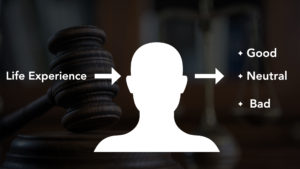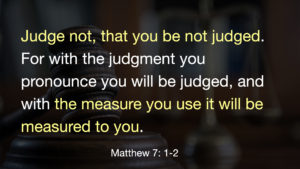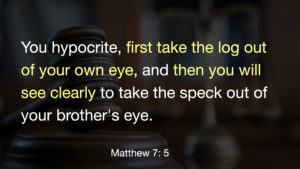Being non-judging is the first attitude you and I need to overcome fear and anxiety. Before delving into how we can learn to be non-judging, let me describe the anatomy behind judging.
The truth about being human though is that we are always tempted to judge. And, that’s kind of how our brain processes information. Our brain first receives the data through the senses we have such as touch, sight, hearing, smell, feeling, etc.
The brain processes all of the data, just like a computer. We make rational decisions out of what the brain presents us, and the human mind is what allows us to accomplish that. The outcome is something like “this is good,” or “this is not so good or not so bad (neutral)” or “this is really bad.”
Ok, whether you’re a believer or not, every human being goes through what I’ve just described. In every single one of us, our brain operates like a data collection while our mind is the executor.

The question is around how the mind executes the data it gets from the brain. The state of your mind is what helps you be non-judging.
How do we learn to be non-judging?
To answer the question, let’s use Matthew 7: 1-5. This scripture may be familiar to you, or may not. In fact, it’s a piece of what we know of as the sermon on the mount.
Among the so many other things, Jesus talks about in the sermon on the mount (Matthew 5 through 7), he’s going to touch at being non-judging. So, let’s take a look at what he taught his audience then, and see how his message can also help us today, especially with learning how to be non-judging.
The universal and spiritual principle
Read Matthew 7: 1-2,

The principle behind these words of Jesus in Matthew 7 implies that someday God will judge every human being. That’s also part of our Christian belief system based on the Apostles’ Creed, which states that Jesus, will come back to judge the quick and the dead.
Based on these two verses, I see two components that come with judgment:
-
-
- If you judge, you will also be judged.
- The measure you use to judge others is exactly the measure that will be used to judge you.
-
Clearly, if you and I want to escape judgment, we have to stop judging others.
Work on yourself
Jesus also said to the crowd (according to Matthew 7),
Why do you look at the speck that is in your brother’s eye, but do not notice the log that is in your own eye? Or how can you say to your brother, ‘Let me take the speck out of your eye,’ and behold, the log is in your own eye? You hypocrite, first take the log out of your own eye, and then you will see clearly to take the speck out of your brother’s eye.
It is always easier to see what’s wrong with other people, but quite difficult to realize what is not right with us. Isn’t it?
[bctt tweet=”To become non-judging, we have to begin focusing on what’s in our own eyes (or our life). ” username=””]
When we do the above, then we will see clearly as stated in Matthew 7: 5.

Being non-judging
[bctt tweet=”Being non-judging happens when you get rid of the log in your eye. You do it when you surrender to God, and drop every log (something heavy) you may have in your eye (or life) at the feet of Jesus (see Matthew 11: 28-30). ” username=””]
As a result, here’s what you experience:
-
-
- You see clearly.
- You have peace of mind.
- You appreciate others and life more than ever.
- You help others more and better.
-
In conclusion
You overcome fear when you first believe that every human being has a story. Also, you know that an encounter with people could mean an opportunity for you to hear their stories. Finally, you understand that you’re not about fixing people, but letting them know that all you want is to hear what’s about who they truly are.

